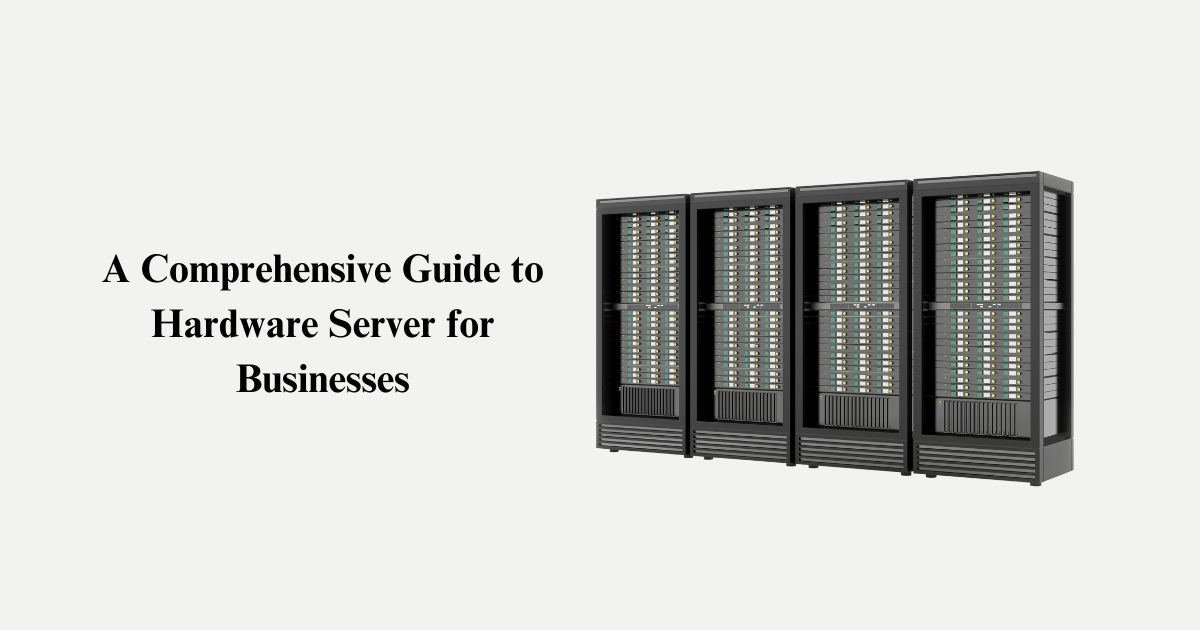How Hardware Servers Can Enhance Your Business Performance?
When it comes to running a successful business, having reliable hardware servers is a key component of your IT infrastructure. A hardware server is essentially the physical machine that hosts the software, data, and applications your business depends on daily. These servers play a major role in managing your business operations, from storing important files to running databases and websites. This blog will explain what hardware servers are, how they work, the different types, and why maintaining them is important for long-term performance.
For businesses, a hardware server is essential in supporting growth and operational efficiency. Whether a company needs to host an e-commerce platform, manage customer data, or run internal software, a dedicated server provides the necessary resources to handle these tasks effectively. Maintaining these servers through regular updates, monitoring, and physical checks helps businesses avoid downtime and extends the server’s lifespan, ultimately reducing operational costs and ensuring smooth performance over the long term.
What is a Hardware Server?
A hardware server is designed to store, process, and manage data and applications for businesses. It provides the necessary resources for tasks like managing customer databases, running e-commerce websites, or handling cloud services. Unlike regular computers, servers are built to handle larger workloads and run continuously, offering businesses reliable performance.
Hardware servers come in different sizes and types depending on the business’s needs. Some are small enough for startups or small companies, while others are large, enterprise-level systems that support vast amounts of data and handle more complex tasks for bigger organizations.
Why Businesses Need Hardware Servers
- Hardware servers play a key role for businesses of all sizes. They provide reliable data storage, allowing companies to keep large amounts of information safe and accessible whenever needed. Many businesses also use servers to host important applications, such as e-commerce websites or internal software, making it easier to manage day-to-day operations.
- In addition, servers help employees collaborate more efficiently by sharing and working on files together, boosting productivity. They also offer backup solutions, ensuring that important data is protected in case of unexpected problems like data loss or security breaches.
Hardware Server Maintenance
Proper maintenance is key to ensuring long-lasting performance once a business invests in a hardware server. Regular upkeep can prevent downtime, protect data, and extend the server’s life. Here are some maintenance tips for keeping your server running efficiently.
Regular Hardware Inspections
It’s essential to conduct routine checks on the physical components of your server. Look for any signs of wear or damage, such as dust buildup, loose cables, or overheating. Physical damage can often lead to system failure if not addressed promptly.
Software Updates and Security Patches
Hardware servers rely on software for managing processes and security. Regularly updating the server’s operating system and applying security patches ensures that it runs efficiently and stays protected from vulnerabilities. Outdated software can be a risk to the entire IT infrastructure.
Monitoring Server Performance
Monitoring tools are available to track the performance of your server. These tools allow you to keep an eye on metrics such as CPU usage, memory, and disk space. Early detection of any unusual activity can help prevent server overload or crashes.
Backup and Disaster Recovery
Having a backup plan in place is essential for maintaining business continuity. Regular backups of data ensure that if the hardware server fails or is compromised, the business can recover without losing valuable information. Disaster recovery plans should be tested regularly to ensure they work when needed.
Choosing the Right Server for Your Business
Choosing the right server depends on several factors, including the size of the business, the data volume it handles, and its growth plans. Different brands offer various types of servers tailored to specific business needs. Below is a quick overview of some of the leading server brands and their offerings:
Each server type offers unique advantages depending on the business’s IT needs. For example, HP’s ProLiant Blade Servers are known for their space efficiency and high processing power, while Dell’s PowerEdge series is popular for scalability and performance.
Benefits of Proper Server Maintenance
Maintaining your hardware server brings many benefits that can help your business run more smoothly and efficiently:
Longer Lifespan
Regular maintenance can extend the life of your server, saving you the cost of frequent replacements. Proper care helps servers continue functioning at optimal levels even as they age.
Reduced Downtime
Regular hardware inspections, software updates, and performance monitoring reduce the risk of server failure, minimizing business downtime. Less downtime translates to more productivity and smoother operations.
Improved Security
Updating your server’s software and applying security patches are crucial to protecting sensitive business data from potential cyber threats. Regular updates ensure the server is less vulnerable to attacks.
Enhanced Performance
Monitoring your server’s performance allows you to detect any issues early, ensuring that the server always runs at peak efficiency. Businesses that maintain their hardware servers will enjoy better application speeds and data handling.
Conclusion
A hardware server is an essential part of any business’s IT infrastructure. It ensures secure data storage, smooth application performance, and uninterrupted business processes. Regular maintenance, including hardware inspections, software updates, and performance monitoring, can extend the life of a server and improve overall efficiency. By choosing the right server for your needs and maintaining it properly, your business can experience long-term success in today’s digital world. Proper server maintenance protects your investment and helps your business stay ahead in terms of productivity, performance, and security. Whether you’re using an HP, Dell, IBM, or any other server brand, keeping your hardware in top condition leads to better outcomes for your business.
If you’re looking for expert support, Agrius IT provides comprehensive hardware server services, from maintenance to upgrades. Whether you need refurbished servers, server parts, or technical assistance, Agrius IT ensures that your servers run smoothly and reliably to meet your business’s demands.



